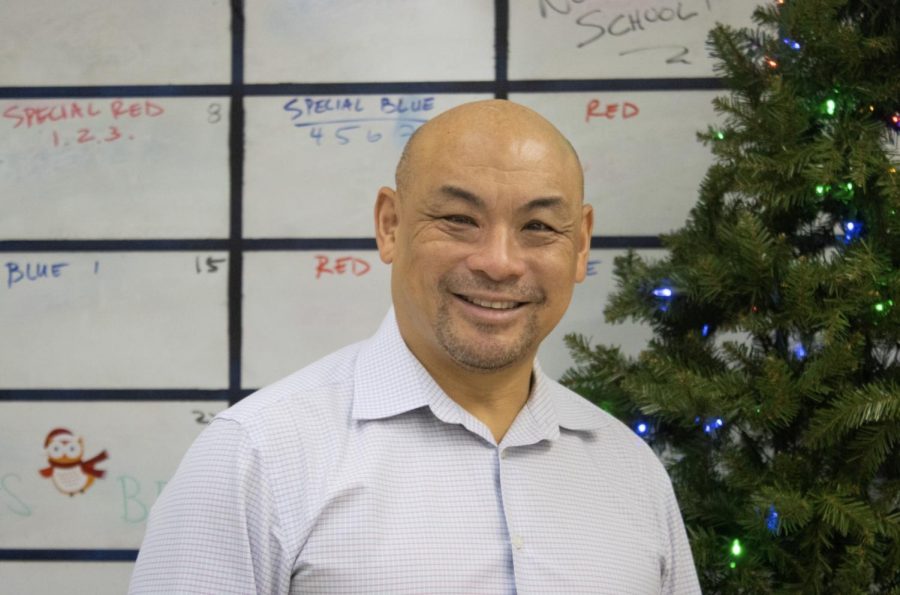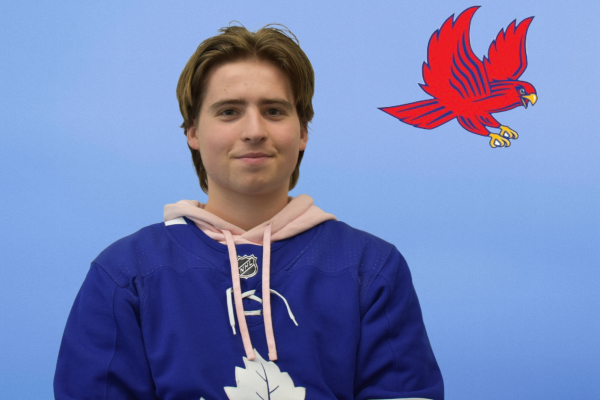Mr. Oey Takes Us Back to the ’80s, Sharing His La Salle Student Experience
Athletics were a big part of Mr. Oey’s high school experience. He participated in soccer, track and field, and cheer.
December 8, 2021
A lot of La Salle students, both past and present, know Mr. Linus Oey as one of La Salle’s most well-established math teachers.
But none of them probably imagined him in a cheer uniform.
Surprising as it may be, that’s what Mr. Oey wore back when he was a student at La Salle, participating in Br. Warren Stewart’s cheer team.
Throughout his time at La Salle, Mr. Oey has noticed a myriad of differences between his reality as a student and the reality of his students today. For one, La Salle’s cheer team has been replaced by the dance team.
After moving to America at seven months old, Mr. Oey attended Lot Whitcomb Elementary and Ickes Junior High before becoming a Lasallian. Ickes doesn’t even exist now – “the school was where the aquatic park is now,” he said.
The decision to attend La Salle was not easy at first for Mr. Oey. “All my friends went to Clackamas and I wanted to go there,” he said. “My parents made a deal with me to try [La Salle] for one year.” However, Mr. Oey found upon starting school that La Salle was the best place for him to be. “I fell in love with the ‘family’ feel here and I never wanted to leave after that,” he said.
Athletics were a big part of Mr. Oey’s high school experience. He participated in soccer, track and field, and cheer. He said that the athletic complex was “the same as right before the new gym.” However, there was a red rock track and a grass field for football and soccer. “I loved soccer on a muddy field,” he said.
As far as academics, courses were “just as rigorous then,” he said. “Except that we had [a] straight seven every day.” He added that it’s hard to compare how difficult his experience was to the experiences of today’s students. “We didn’t have social media to distract us from our classes,” he said.
Social media is something Mr. Oey cites as one of the biggest differences he sees in today’s student experience. In the social scene, without social media, “you hung out with friends more,” he said. “If you couldn’t call them on a landline you had to go to their house to find them.” As far as school, Mr. Oey definitely sees the internet as a roadblock on the path to success for today’s students. He sees it as a distraction from schoolwork. “I believe that things are too easily accessible to students now,” he said. “Social media and the internet has made it too easy to find just answers.”
When Mr. Oey graduated from Oregon State University in 1992, he immediately returned to La Salle to begin educating. But his career as a teacher got off to somewhat of a rocky start. “I started as a health teacher here in the middle of the year because one of the teachers was on maternity leave,” he said. “That class had 40 people in it, and had freshmen through seniors. [It was] one of the hardest classes I ever had to teach.”
However, he soon realized that math was the subject he wanted to teach. Math didn’t come easy for Mr. Oey as a student, but this was part of the appeal. “I knew it didn’t come easy to everyone,” he said. “It taught me to find different ways to help kids understand.”
Mr. Oey has taught many current teachers when they were La Salle students, and he has always enjoyed watching them mature and “take the step as colleagues instead of students,” he said.
A major point of emphasis for Mr. Oey is helping students understand the processes behind math instead of just looking at the outcome. “In order to truly understand, you need to know how the answers came about,” he said.
After 29 years of teaching, Mr. Oey has seen a lot. He will become a grandfather in May 2022. But even after all that time, he still thinks back to his student experience often, with respect to how they impact the way he teaches today. “You have to love what you do, and realize that all students learn differently,” he said. “Math doesn’t need to be hard, you just have to be willing to look at it a different way sometimes.”






Collins • Dec 10, 2021 at 8:48 am
The cheer team Mr. Oey led in the 90’s was amazing… My 6 year old son watched them instead of the football team because of all the stunts, throws, pyramids, etc. His Blazer experience made it quite a program.